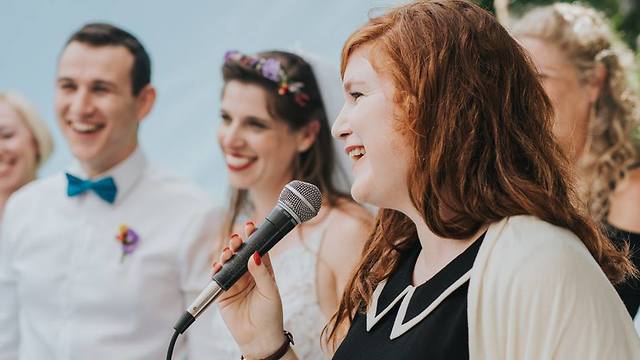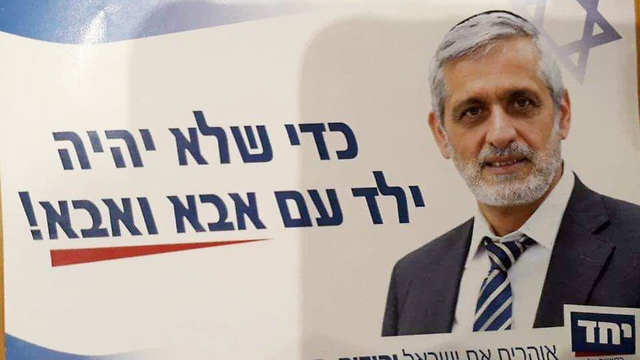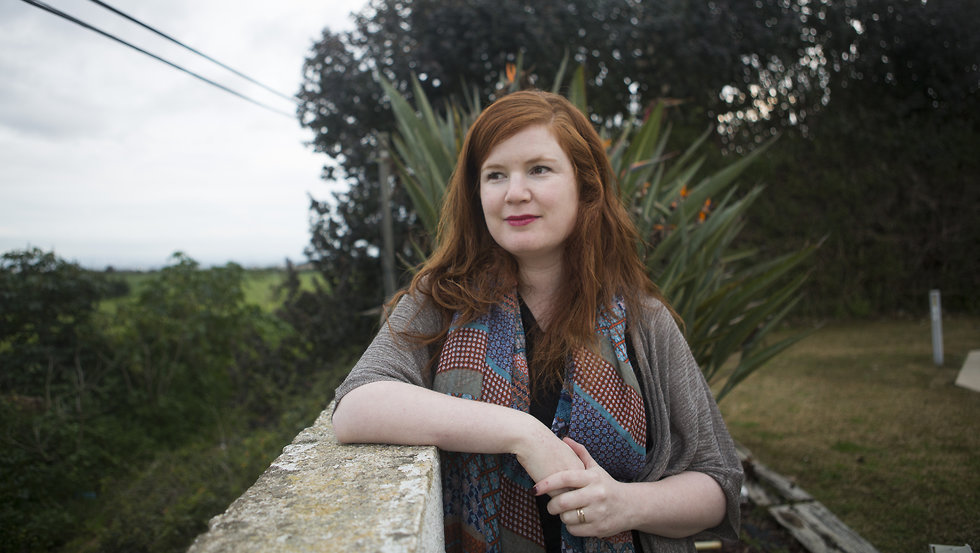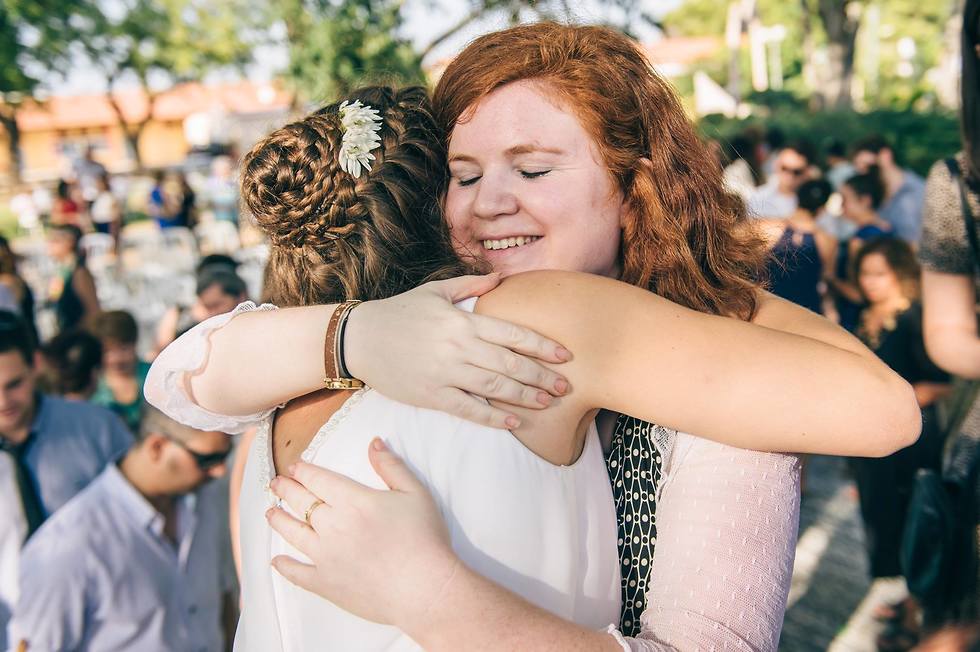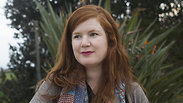

Israel's rabbi for same-sex couples
Tamar Gur Krause is a Reform rabbi with hundreds of marriage ceremonies under her belt; she believes in equality and love and the need for Judaism to develop and adapt to the times, rather than stay stagnant; 'I see myself as a bridge that brings people to a life of spirituality and meaning that derive of generations of Jewish texts,' she says.
"In an Orthodox wedding ceremony, the rabbi stands in front of two puppets," she says. "One puppet, who is the bride, stands covered and silent, while the other puppet, who is always male, repeats the rabbi's words in Aramaic without understanding anything. After the male puppet breaks the glass and the two puppets kiss, the party can start. The bride and groom will know what songs are going to be played at every stage of the evening, but they will have no idea what they're saying under the chuppah (Jewish wedding canopy)."
In the Reform wedding ceremonies she holds, the 31-year-old Gur Krause says, "the masters of the ceremony are the bride and groom, or the bride and bride, or the groom and groom."
The weddings she conducts are completely egalitarian, with both people breaking the glass. "And in my ceremonies, we sing 'the voice of the groom and the voice of the groom' or 'the voice of the bride and the voice of the bride,'" she says.
Eli Yishai's campaign against a child having "a father and a father" didn't surprise her, nor did its timing—before the elections.
"There is no doubt the Bible is against homosexual intercourse," she says. "It wasn't an accepted thing. But many things that were not accepted in the past have become accepted now. It used to be acceptable to stone criminals, and this practice disappeared in our time. The Torah also says 'an eye for an eye and a tooth for a tooth,' but we don't do that. So why pick on LGBT marriages?"
"Judaism is, after all, a living religion; it always has been and always must be in development, to adapt itself to life. This is what has been protecting it all of these years—our ability to go with the changes," she says. "Today, as well, we must not fear change. It is our commandment to live with equality for all, no matter what a person's gender or sexual tendencies are. As far as I'm concerned, equality and love are far more important than something that was written in the distant past."
So how do you explain Eli Yishai's campaign?
"No more than populism; deriving of political and social considerations. LGBT marriages threaten the existing order. When Eli Yishai dares to speak in this manner and come out with such an aggressive and violent campaign, it's only because he knows the revolution is already here. The Orthodox understand that the patriarchy is losing its hegemony, and that is why they're bringing out their top guns. We have nothing left to do but respond to such a campaign with love. You can't fight the darkness. All we can do is increase the light. We can quote the verse 'Beloved is man, for he was created in the image (of God)' so the public doesn't think, God forbid, that this terrible campaign represents Judaism."
I met with Gur Krause on Friday afternoon after her meeting with a couple of women who came to her home to plan their wedding ceremony. Her eldest daughter saw them and said, "Mom, when I grow up, I want a bride too."
The red-headed rabbi embraced her daughter and replied: "When you grow up, you will marry someone you love."
Parents want a male rabbi
Even though she already has hundreds of these ceremonies under her belt ("90 percent of my couples could have gotten married through the Chief Rabbinate, but chose a different ceremony," she says), there are still those who consider her somewhat of an attraction.
"The initial objections come mostly from the parents, some of whom may have never been to a synagogue, but the moment it comes to their child's wedding, they demand an Orthodox ceremony and allow themselves to put their foot down, because they're the ones paying for the wedding," she says.
"I meet a lot of enlightened people who threaten not to go to their child's wedding if there isn't a kippah-wearing male rabbi there. When the young couple manages to convince their parents that a Reform ceremony would be far more meaningful for them, another obstacle arises: Why a female rabbi? When I walk into the hall, I hear the murmurings of astonishment," she says.
Don't they make you want to make a run for it?
"On the contrary, this is a challenge. During my wedding ceremonies, there's complete silence, because the audience is involved in the ceremony, which is conducted in Hebrew and arouses curiosity and interest. More than once I had the father of the groom walk up to me after the ceremony and say 'Forgive me, I wish my younger children would get married in a Reform ceremony too.' At the end of every evening, many couples approach me and say, 'It's a shame we didn't get married this way.' When they explain that their enthusiasm is actually because of the fact the Reform ceremony includes so many elements from the familiar Orthodox one, it makes me laugh a little. What do you think, that just because I'm a Reform rabbi, I'm supposed to conduct a shamanic ceremony?"
Incidentally, did you get married through the Chief Rabbinate?
"Of course not. I got married six years ago, when I was still starting out, and a good friend married us according to what I taught him. Today, I'd do it differently. My husband and I would go through the process that the couples I marry go through. It's not my identity, as a Reform rabbi, that informs the ceremony, but the couple's identity. They are the ones who put the content into the ceremony, and that is why it is so meaningful for them."
Gur Krause was raised in Haifa in a secular family ("very!" she stresses, "My siblings didn't celebrate Bar Mitzvah") and the Jewish world revealed itself to her only when she was 17.
"I went to Boston with a delegation of high schoolers. I was a guest of the Conservative community, and it felt like I was back home, as if it was part of a past life. I fell in love with the tune of the cantorship, as if I grew up listening to it, while I actually grew up listening to Chava Alberstein and Danny Robas. When I went back home and tried to explain I had a spiritual—not Halachic—experience, my parents panicked, thinking I may become religious.
"I went to Noam, a Conservative youth group, and lived in two parallel worlds. Before Shabbat, I went to the synagogue wearing a skirt, and after the prayer, I changed into jeans and went out with friends. But when I did a pre-army service year at a preparatory program in Jerusalem, I suffered a blow. The Orthodox forbad me from serving as a cantor because I was a woman, and I felt confused. Did me going into the Jewish world require me to toss away the values I was raised on, like equality between the sexes?"
After completing her IDF service, she got two degrees (the first in education, history and Bible, and the second in the study of US Jewry) and was accepted to the Jerusalem branch of the Reform Movement's rabbinical school. "After five years of studies, I was ordained as a Reform rabbi last November," she says.
"It was obvious to me that I would only marry a man who believes in equality in the Jewish world. My husband has two Orthodox brothers, and I was very moved when they came to my ordination ceremony."
Judaism must move with the time
Her husband, Ariel Krause Gur, is a child psychologist. They live in Moshav Bat Shlomo, near Zikhron Ya'akov, and together they raise their two daughters: 4-year-old Abigail and 6-month-old Naomi. "I'm the one who recites the Kiddush blessing, because it's natural to us, and my husband is very supportive," she says.
What is your authorities as a Reform rabbi?
"Wow, it's complex," she says. "An Orthodox rabbi rules on Halacha. The Reform Movement sees Halacha as a source of inspiration, and so I see myself as a bridge that brings people to a life of spirituality and meaning that derive of generations of Jewish texts. The Orthodox world espouses conservativeness, while to me Halacha comes from the word 'lalechet' (to walk), because it wasn't conservativeness that protected the Jewish world, but rather its ability to adapt to changes. It's true, the Torah says that 'A woman's singing voice is considered nakedness,' but it also says 'let me hear your voice; for your voice is sweet, and your face is lovely.' It doesn't make any sense that in the name of religion, it's okay to exclude women, to ostracize LGBTs and to be racist."
As a female Reform rabbi, she is aware of the fact her status is more precarious than that of a male Reform rabbi. "When I get to the wedding hall and am identified as a female rabbi, the manager allows himself to say to me, 'Come, sweetheart,' something he won't dare say to a man," she says. "But the very fact a woman can be a religious authority is a mark of social change. Last year, 300 couples were interested in a Reform wedding for ideological reasons, because they wanted a ceremony to speak their language, and only eight of them agreed to have a female Reform rabbi marry them."
There's still a long way to go.
"The journey to my ceremony is not short, either. I hold four meetings with the couple, during which we discuss fundamental questions, such as how they see their path in life and what are their expectations from their life together. Recently I met a woman whose wedding I officiated two weeks ago, and she told me: 'We were talking about you. We have a baby, and I told my husband I wanted to go back to doing yoga twice a week. And he claimed it's impossible, because we still don't have a babysitter. Instead of getting angry, I led him to the Ketubah (Jewish marriage contract) that we wrote together with you, and which is hanging in our bedroom over our bed. The second article in the Ketubah says that "We will each do our utmost efforts to ensure the other can keep their hobbies and private world." Right on the spot, my husband promised to do all the necessary backflips to make sure it happens.' The Ketubah, which is written by the couple, is their core. In it they write how they imagine their home, the education of their children, the relationship with the extended family, and more. In reality, this is a couples' workshop done before the wedding, and not after it when a crisis emerges."
What's the validity of the Reform wedding ceremony?
"In the State of Israel, you can get a marriage certificate only if you register with the Chief Rabbinate or bring a marriage license from abroad. The Reform Movement issues a marriage certificate that testifies to the fact the couple are common-law spouses, and they get all of the same rights as married people do, such as taking out a mortgage and listing their shared children in their IDs. Israel is the most advanced country in the world in the field of common-law couples. At the same time, the movement encourages the couples to sign a prenup, and in case of divorce they act according to that. When we explain to the parents of the bride and groom that their children's rights won't be harmed because they chose a Reform wedding ceremony, and that their grandchildren won't be harmed either, they become convinced."
During wedding season, she goes out to work almost every night. Her husband stays home with the girls. According to her, he says: "I'm not the babysitter, I'm the dad," and this is another example of full equality.














